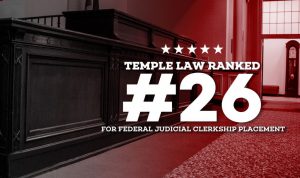Unless you’re a lawyer or a law student, you might not know what a law clerk does. When I tell people that I’m a law clerk for a federal judge, sometimes they nod, smile, or just change the subject. More often than not, however, they ask, “What does that even mean?” Once I explain, many then ask, “Do you get paid for that?” I do indeed get paid, but the benefits of clerking stretch far beyond my government paycheck.
Broadly speaking, law clerks exist to ensure that the judges they work for are as informed as possible before making decisions. They do so by researching the law involved in each case and writing memos analyzing the facts of that case and the litigants’ arguments in light of this law. They also attend trials and hearings, where they mostly observe and take careful notes so that they can later discuss with their judges any unexpected issues that arose during these proceedings.
“Through [my clerkship] experiences, I not only bolstered my abilities to analyze and explain complicated issues, but also gained valuable insight into how cases were decided.”
Unlike most law students, I knew about clerking before law school. For twenty-five years, my grandfather sat on the federal bench in Pennsylvania. He loved his law clerks and talked about them often. Inspired by my grandfather, I entered law school in 2011 with the thought that clerking for a federal judge was something I might try to do.
As I started my second year of law school, I made clerking a concrete goal. The previous summer, I had interned for the Honorable Lawrence F. Stengel, a federal district court judge. District court judges are the trial judges in the federal judiciary; all cases in federal court begin with them. I loved that internship. I wrote memos analyzing interesting legal issues, sat in on settlement conferences, and observed Judge Stengel in court as he accepted guilty pleas and imposed sentences. These experiences opened my eyes to how the federal judiciary works, at least at the trial level, and I left craving a clerkship for after graduation.
To get one, though, I knew I needed a lot of help—and luck. Good law school grades are the bare minimum for even getting a look from a federal judge, and judges are bombarded with hundreds of applications every year for one to three open positions.
Fortunately, I had Temple’s help. When the time came to apply, during the spring semester of my second year, I reached out to a few of the many fantastic professors at Temple to ask for letters of recommendation. They agreed without hesitation and quickly turned out detailed letters. Temple Career Services then stepped in to help me (and others) with the rest, assembling our applications and sending them off.
A few months later, after interviews with a number of judges, I landed a clerkship for 2014-15 with the Honorable William H. Yohn, Jr., a federal district court judge here in Philadelphia. I was ecstatic—not just about the chance to clerk but about the chance to clerk for Judge Yohn. Over twenty-plus years on the federal bench, he had developed a sterling reputation among lawyers, other judges, and, of course, his law clerks.
“To get [a clerkship], I knew I needed a lot of help—and luck. Good law school grades are the bare minimum for even getting a look from a federal judge, and judges are bombarded with hundreds of applications every year for one to three open positions.”
I was so elated, in fact, that I decided to apply for another clerkship soon thereafter in the fall of my third year at Temple. At that time, I was interning for the Honorable Theodore A. McKee, the chief judge of the U.S. Court of Appeals for the Third Circuit. These judges, who sit in three-judge panels, decide the cases that are appealed to them from the federal district courts. Like my earlier internship, this one inspired me to apply to be a law clerk there. And with the help of a friend, I secured a clerkship for 2015-16 with the Honorable Marjorie O. Rendell, a judge known for both her legal acumen and her fondness for her law clerks. I couldn’t believe my luck.
Fast forward a year. I had graduated from law school and taken the bar: it was time to start my clerkship with Judge Yohn. I was expected to hit the ground running, and the learning curve was steep. Each case assigned to me presented factual and legal issues that I needed to master and then write memos to Judge Yohn discussing my understanding of them. I also helped him with a complex, multi-week civil trial. Through these experiences, I not only bolstered my abilities to analyze and explain complicated issues, but also gained valuable insight into how cases were decided.
My year with Judge Yohn passed with lightening speed, and before I knew it I had moved on to my clerkship with Judge Rendell, whom I clerk for now. Here, I spend much of my time preparing her for oral arguments in our cases, which occur about five to six times a year. To that end, I review the litigants’ briefs, research the issues involved, and write memos to her explaining the law underlying these issues. This experience has further enhanced my analytical and writing skills, as well as provided me with a front-seat to how cases are decided at the federal appellate level, a very different animal.
Sadly, I have only a few months left in this clerkship. Although I’m excited to take the next step in my career and work as a law-firm litigator, I know that I’ll miss clerking. Not a day goes by that I don’t think about how lucky I am to have had these rewarding experiences, and I know that they will serve me well in the future.



